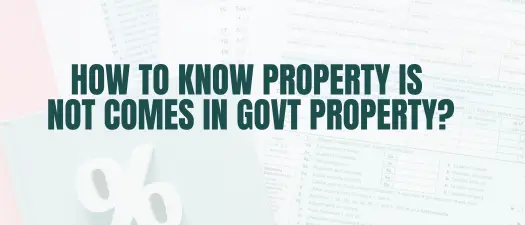More to know property is not comes in Govt property

It's confusing to distinguish between private and government properties, but don't worry! In this blog post, we'll guide you through the signs that indicate a property is not owned by the government. From legal documents to tax records, we've got you covered. So, sit back and read on to learn how to make sure your investment goes into a safe and secure private property.
Planning to invest in a Property and Wondering
What is Government Property? - There are many properties that the government owns. These properties are known as "government property." There are a few ways to know if a property is government property. One way is to look for a sign that says "government property." Another way is to ask the person who is selling the property if it is government property.
Reasons Why Knowing if a Property is Government Owned is Important - There are many reasons why knowing if a property is government owned is important. For one, the government may have different rules and regulations regarding the use of the property than a private owner would. Additionally, the government may be able to offer tax breaks or other financial incentives for those who use or develop government-owned land. It is generally easier to obtain permission to use government-owned land for certain activities than it is to secure permission from a private owner.
How to Determine if a Property is Government Owned - There are a few key ways to determine if a property is government owned. First, you can check with your local county assessor's office. They will have records of all properties in the area and will be able to tell you if the property in question is government owned. You can also check with the city or town hall in the municipality where the property is located. They will also have records of all properties in the area and should be able to tell you if the property is government owned. You can contact the Department of Natural Resources in your state. They should be able to provide you with information on who owns what land in your state.
What to Do if You Suspect the Property is Government Owned - If you suspect that a property is government-owned, there are a few things you can do to confirm your suspicions. First, check with your local government offices to see if they have any record of the property in question. You can also contact the previous owner of the property, if possible, to ask if they were ever informed that the property was government-owned. You can consult with an attorney or real estate agent to see if they have any knowledge about the property in question.
Alternatives to Investing in Government Property - There are a number of alternatives to investing in government property. These include:
1. Investing in private property: This is often seen as a more profitable and less risky option than investing in government property. There are a number of reasons for this, including the fact that private property is not subject to the same level of regulation as government property.
2. Investing in other types of assets: There are a number of other asset classes that can be more profitable and less risky than government property. These include stocks, bonds, and commodities.
3. Putting your money into savings: we often see This as the safest option, as your money is not invested in any assets but is instead held in a safe place where it will not lose value.
4. Taking out loans: This can be a good option if you are confident in your ability to repay the loan and if you believe that the interest rate on the loan will be lower than the return you could earn by investing in government property.
Knowing if a property is not government-owned can be tricky, but by following the steps outlined in this article you can determine the ownership easily and accurately. By looking at public records, talking to the local authorities, or simply asking around in your community you should have no trouble identifying who owns a particular piece of land or building. With these simple steps, you will now have peace of mind knowing exactly where your property stands!
Leave a Comment



